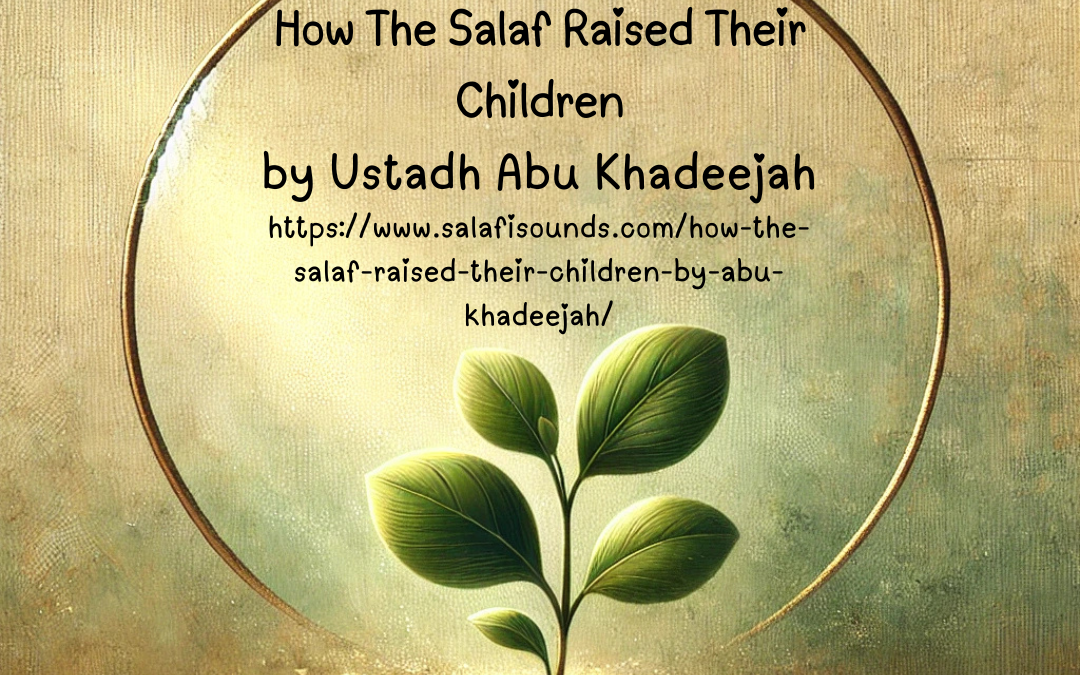A lecture by Ustadh Abu Khadeejah Abdul Wahid حَفِظَهُ اللهُ, “How the Salaf Raised Their Children” is available on the Salafi Sounds website, and the transcription of the lecture can be found on the Ar Risalah Publications website.
Indeed, the parable of the good word is like a good tree, as mentioned in the Quran (14:24-27), which symbolizes the strength and stability of faith. Instilling a love for the Sunnah in our children is akin to nurturing a young sapling that, with care and dedication, can grow into a strong tree, deeply rooted in the path of Salafiyyah. By guiding them early on to value their Islamic heritage and the Sunnah over worldly distractions, we help them develop a lasting devotion. As we walk the path laid out by our righteous predecessors, we aim to ensure that our children’s hearts resonate with the teachings of the Prophet Muhammad (ﷺ), growing in faith and wisdom. This is the essence of a nurturing Islamic upbringing that seeks to cultivate a generation whose lives are firmly anchored in their spiritual identity.
Ali ibn Abi Talib رَضِيَ اللهُ عَنْهُ imparted wisdom on parenting: “Play with them for the first 7 years (of their life); then teach them for the next 7 years; then advise them for the next 7 years (and after that).”
Ustadh Abu Khadeejah’s reflection on the naseehah by Ali رَضِيَ اللهُ عَنْهُ during his lecture beautifully aligns with the contemporary understanding of parenting, “connection before correction” emphasizing the significance of establishing a strong connection with children in the first seven years. This initial connection lays the groundwork for the next phase of parenting, where discipline and correction become more prominent. The stronger the bond formed during the early years, the smoother the transition into the second seven-year phase, where teaching and guiding become the focus. This approach underscores the importance of nurturing a loving and trusting relationship from the outset to facilitate a positive and effective parenting experience.
The lecture provides key insights into Islamic parenting (Tarbiyatul Aulad Fil Islam), highlighting the crucial steps of building a strong bond with children, applying discipline at its places, and fostering a friendship as they grow. This nurturing approach shapes how children will view you as their trusted figure, where they can turn to for wisdom and guidance, إِنْ شَاءَ اللّٰهُ.
The first 7 years of a child’s upbringing:
- Build a Strong Connection: The initial 7 years are crucial for establishing a solid relationship with your child.
- Foundation for Future: A robust early foundation leads to smoother parenting in later years.
- Invest Time and Effort: Use this period to heavily invest in your child’s future development.
- Rewarding Experience: Engaging with your children now can bring spiritual rewards until the Day of Judgement.
- Play and Teach: Combine play with teaching Islam and good manners.
- Ease of Learning: Ensure that learning is fun and not burdensome.
- Gentle Guidance: Be kind and patient, avoiding harshness in teaching.
The next 7 years, following the initial foundational period, can be referred to as the “Developmental Stage” or “Stage of Learning and Growth.” During this time, children build upon the foundation laid in the first 7 years, expanding their knowledge and understanding of the world around them. It’s a period where formal education begins to take shape, and moral and social skills are further developed:
- Age 7 as a Critical Learning Period:
- Children are highly receptive, eager to learn and absorb knowledge.
- Early years form a crucial foundation for future learning and character building.
- Teaching Them Everything:
- Aqeedah: Establish a strong foundation in Islamic faith and beliefs.
- Halal and Haram: Clarify what is permissible and what should be avoided.
- Fiqh: Offer guidance on Islamic jurisprudence for daily life.
- Qur’an and Seerah: Essential studies for understanding Islam and the Prophet’s life.
- Prioritizing Deen (Religion):
- Place religious education before secular studies.
- Daily recitation and memorization of the Qur’an is encouraged.
- Connecting with Scholars:
- Develop a bond with ulama to grow in knowledge and spirituality.
- Seek opportunities for children to learn directly from scholars.
- Masjid and Notepads:
- Encourage regular masjid attendance for communal prayers and learning.
- Promote the habit of note-taking to capture knowledge at any opportunity.
- Balancing Home and Outside Exposure:
- Ensure a balance between home education and community interaction.
- Guide children with the principles of Sunnah, avoiding Bidah.
- Learning from Salaf (Pious Predecessors):
- Inspire children through the stories of the Salaf.
- Teach the importance of emulating the Salaf’s exemplary conduct.
- Knowing the Names of Imams of the Salaf:
- Educate children about the notable Imams and their contributions to Islamic history.
- Teaching Sports:
- Swimming, Archery, and Horseback Riding: Encourage these sports as they offer physical fitness, teamwork, and sportsmanship benefits, as recommended by the Prophet Muhammad (ﷺ).
Notable Examples:
- Abu Bakr Sijistanee رَحِمَهُ اللهُ: Authored his first book at age 11 on the biography of a great imam.
- Imam Ahmed رَحِمَهُ اللهُ: Read his musnad, a collection of 40,000 Ahadith, to his children for 12 years.
- Imam al-Bukhari رَحِمَهُ اللهُ: Began compiling his Sahih at 16 and completed it at 32.
- Shaykh Abdul Wahab رَحِمَهُ اللهُ: Become imam of the masjid, memorized the Quran and entered into marriage at the tender age of 12.
Signs of Adulthood:
- Growth of hair on private parts.
- Experience of wet dreams, indicating readiness for sexual intercourse.
- Onset of menses for females.
This format highlights the key aspects of Islamic education and upbringing for children in the age group of 7-14 years, emphasizing the importance of a well-rounded and faith-based development, including physical activities and learning from the lives of significant Islamic figures.
The final 7 years, often referred to as the “Advisory Stage”
- Mukallaf (Accountable Age): Recognize that by 14, children are considered full adults in Islam, accountable for their actions.
- Independence and Personality: Acknowledge their growing independence and unique personalities.
- Peer Influence: Understand that peers may influence them more than parents at this stage.
- Befriend and Advise: Transition from a parental role to that of a friend and advisor.
- Trusted Confidant: If prior stages were successful, you’ll be their go-to person for advice.
- Respect Their Choices: Accept that they will make their own decisions, whether right or wrong.
- Continued Guidance: Stay involved and offer wisdom when sought.
This stage is about guiding young adults as they navigate their own paths, providing advice and support while respecting their autonomy.
The good manners notes from Abu Khadeeja’s lesson emphasize respectful and disciplined behavior in children. Here’s a summary of the key points:
- Permission to Speak: Children should learn to speak only when allowed.
- Respectful Behavior: They should not be disruptive, especially around adults.
- Eye Contact: When reprimanded, children should look down, not directly into the eyes.
- Proper Posture: Sitting respectfully, as a student does before a teacher, without casual postures like raising feet.
- Serving Guests: Children should be taught to serve and respect guests.
- Seeking Permission: They must learn to ask for permission before leaving a room and to show deference by allowing elders through doors first.
- Respect for Elders: Teaching children to respect family and friends is crucial.
- Proper Address: Children should address parents with respect, not by first names.
- Appropriate Behavior: Children should not exhibit tantrums or baby-like behavior beyond a certain age.
- Closeness and Knowledge: Encourage a close relationship and instill a love for learning (ilm).
These guidelines aim to cultivate good manners and respect within children, forming a foundation for their personal development and social interactions.
Below is a bit of extra info by Abu Talha Dawud Burbank رَحِمَهُ اللهُ.
Imam adh-Dhahabee رَحِمَهُ اللهُ mentioned in ‘Siyar A`laamin-Nubalaa.’ (10/233), in his biography of aboo Mushir `Abdul-A`laa ibn Mushir ad-Dimashqee:
” Ibn Zanjawayh said: I heard Aboo Mushir say:
“Strictness with a child at an early age will bring about increase in his intellect in later life.”
[ adh-Dhahabee said about Aboo Mushir in his biography in ‘al-Kaashif’:
The Imam, Aboo Mushir al-Ghassaanee, the Shaikh of Shaam.(He narrated) from Sa`eed ibn `Abdil-`Azeez, and (Imam) Maalik; and from him (narrated):Ibn Ma`een, Aboo Haatim, and`Abdur-Rahmaan ibn ar-Ruwaas. He was from the finest of the scholars, and from the most eloquent and correct in speech, and one of those who memorized most. He was threatened with the sword to force him to say that the Qur’an was created, but he refused, so he was imprisoned. He died in Rajab, in the year 218 (H).”]
* Ibnul-Jawzee رَحِمَهُ اللهُ reported in ‘Dhammul-Hawaa’ (p.116) that Ibraaheem ibn Ishaaq al-Harbee (d.285 H) said:
“Keep your children away from evil companions, before it happens that you have immersed them in, and dyed them with affliction”,
and he said:
“The beginning of the corruption of children comes about from one another.”
[Reference: Dr.Sulaymaan ibn Ibraaheem al-`Aayid’s introduction to ‘Ghareebul-Hadeeth’ of Ibraaheem al-Harbee.
Note:
Ibn al-Jawzi رَحِمَهُ اللهُ said:
“The cure for conceit is to know one’s faults… How can a person have self-conceit when knowing that Imam Ahmed knew one million hadith by heart, and Kahmas ibn al-Hasan used to recite the whole Quran three times a day and Salman al-Taymi prayed Fajr with the same wudhu of ‘Ishaa for forty years.”
Book: Disciplining the soul by Ibn al-Jawzi (d. 597 AH)
May Allaah grant us the wisdom to comprehend these teachings and the ability to apply them in our lives, particularly in how we parent our children. Aameen.
When the connection wasn’t formed during the first seven years, how can we bridge the gap? In my next article, we’ll delve into the art of nurturing bonds that weren’t forged in early childhood. Stay tuned to discover how we can reconnect with our children’s hearts and minds, إِنْ شَاءَ اللّٰهُ.


